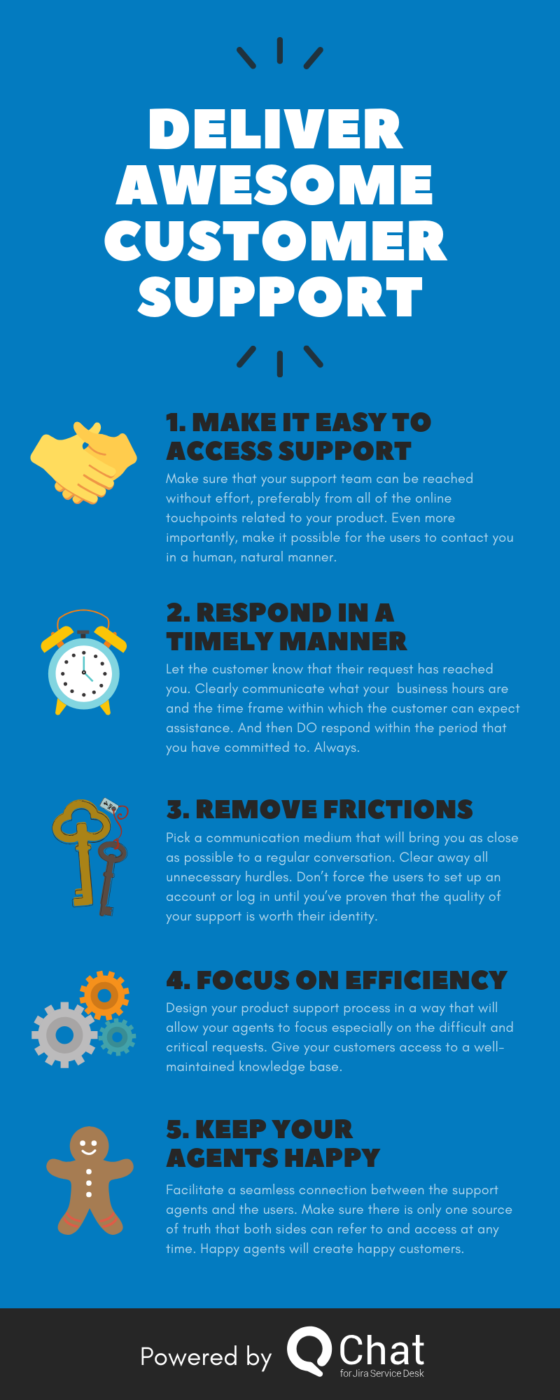This is a guest post written by Magdalena Zacharczuk, Product Marketing Manager at Spartez, makers of Chat for Jira Service Desk.
A personal relationship with your customers puts a face on your business, building trust, loyalty, and positive word-of-mouth. The easiest and fastest way to make this happen is via genuine human interaction. But in today’s anonymous, Internet-driven world, it seems that people rarely interact on a personal level. The rare exception? Customer support.
Good product support is smart marketing

Providing quality customer service has always been common sense for businesses, but it’s much more than that. Research has found that responding quickly to customer complaints makes people willing to pay more in the future. And this may sound like a paradox, but fixing issues for your customers will cause them to be more satisfied than if they never had a problem in the first place.
Defining customer expectations of support and meeting them effectively is critical. Four out of five customers who get their questions answered and issues resolved are more likely to become (and remain) active users of your software. The impact of bad service is much higher. A customer who is dissatisfied will share their negative experience with up to 15 other users. And customers are 4 times more likely to defect to a competitor if they face support-related issues than when they are unhappy with the pricing.
So, how to go about this challenge and ensure an awesome customer support experience?
5 tips for delivering next-level customer support
1. Make it easy to access
It’s as simple as that: make sure your support team can be reached with little effort, preferably from every online touchpoint related to your product. An anonymous email address tucked away in the depths of your website or a lengthy contact form are far more likely to repel users than make them believe their voice is welcome. Instead, choose a communication medium that will bring you and your customers as close as possible to human conversation.
2. Respond in a timely manner
It’s obvious that customer requests should be addressed as quickly as possible. Instant, live conversation is ideal. But what if your team is small, and you don’t have the capacity to immediately handle requests that come in during the weekend, or from customers in different time zones? Use automation to let the customer know that their request has reached you. Employ AI assistants to at least handle the greetings while your support team is unavailable. Clearly communicate what your business hours are and the time frame within which the customer can expect assistance. And then respond within the period you commit to — always.

3. Remove Friction
Get rid of all unnecessary hurdles. If possible, don’t force users to set up an account or log in until you’ve proven that the quality of your support is worth their identity. If the customer is irritated, they’re bound to become more so if they can’t start a conversation until they’ve retrieved a long-lost password.
4. Focus on efficiency
Design your product support process in a way that will allow your agents to focus on the most difficult and critical requests. There’s a fair chance that a significant percentage of issues coming your way are repetitive and simple to deal with. Perhaps they don’t need the attention of a support agent at all and could be dealt with quickly if users were given access to a well-maintained knowledge base, preferably one that is closely integrated with your support communication channel.
5. Keep your agents happy
Make your support team’s life easy, because happy agents make for happy customers. Facilitate a seamless connection between support agents and users. Make sure there is only one source of truth that both sides can refer to and access at any time. If your team has everything they need to deliver awesome customer support — environment, tools, context, customer insight — they’ll do just that.
Maintaining a customer service mindset
We’ve built Chat for Jira Service Desk to meet our own needs with regard to delivering the best possible product support. But it’s more about the mindset and readiness to commit than about the toolset, so if you take one thing away from this article, let it be this: good support is smart marketing.
The Support Team at Spartez processes 250 tickets per month. They work hard for great customer support reviews because they see it as an investment. It’s not an onerous chore or burdensome overhead — it’s simply proven to be worth the effort.
